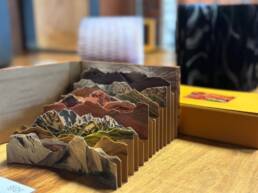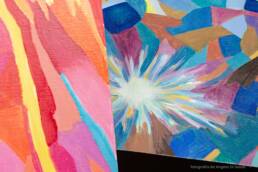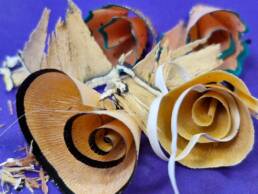THE SUITCASE - a wandering home of artist's books
It was born from the desire to provide a closer look at the multiple universe of artist books. In them, images, photographs, drawings, writings, maps, graphics, among other elements, occupy pages, outlining constructive spaces and visual narratives that challenge our usual understanding of conventional books. This leads us to the question: after all, what possibilities does the book offer as a support for artistic expression?
To try to answer this question, we designed an artistic residency focused on deepening creative processes and developing individual projects. It also aims to explore the themes underlying artistic production and build an axis that permeates these issues, providing guidance and references with the aim of expanding the visual poetic repertoire in its hybrid and interactive possibilities. This will enable the maturation of a personal language, integrated with content relevant to the sensorial and subjective reality of each participant.
All participants are encouraged to complete an artist’s book, which will be transported in the “suitcase” to one or two international exhibitions. In the first edition, we had an exhibition in Mexico City, at the El Rule Cultural Center, during the Zócalo International Book Fair (FIL), in October 2024, and another in São Paulo, at Galeria Página, in November 2024. In 2025, MALA will land in Paris to hold two exhibitions: one at the Galerie Enseigne des Oudin and another at the Médiathèque Marguerite Duras, both in September. In addition to these international exhibitions, there will also be exhibitions in Brazil: during the Pacaembu Book Fair and at the Mario de Andrade Library, in São Paulo.
Advisors
After a series of virtual meetings, intense exchanges of ideas and gradual maturation over time, we set MALA in motion in 2024! Monique Allain, a visual artist based in New York, Chica Boyriven, a visual artist based in Paris, Lili Pardini, a book creator based in Embu das Artes, and Estela Vilela, a bookbinder and artist based in São Paulo, have combined their experiences to offer an online and in-person artistic residency focused on the production of artist books.
The main objective of this residency is to stimulate exchange and foster exchanges between emerging and transversal themes that expressively manifest themselves in the universe that intertwines libraries, books, reading and contemporary artistic production. The growth of artists who, today, with greater access to production tools, are moving from digital to artisanal in a single project, betting on the artist's book as an expressive and catalytic language for their trajectories, is visible. Whether it is a photobook, an object-book, a visual poem, a zine, etc., regardless of the opacity and ambiguity of the definitions of the term, the artist's book has stood out as a unique and innovative form of expression in various cultures.
With the aim of establishing consistent and periodic exchanges, we created MALA, to which we wish many journeys, displacements, new perceptions and expansion of aesthetic possibilities, exploring different perspectives through multiple lenses.

2024 Edition SUITCASE
In the 2024 edition, MALA started with a theme that crosses time, territories and feelings: displacement. Inspired by Guimarães Rosa, we investigated what we carry, leave behind and transform into movement.
MALA 2025 Edition
In 2025 MALA has grown!
This edition features 30 artists, and we're launching a new hybrid format that combines an in-person immersion with online sessions.

M.A.L.A 2026
Registrations
Are you interested in embarking on the next edition?
Join the waiting list for 2026, just leave your name and email here 🙂

